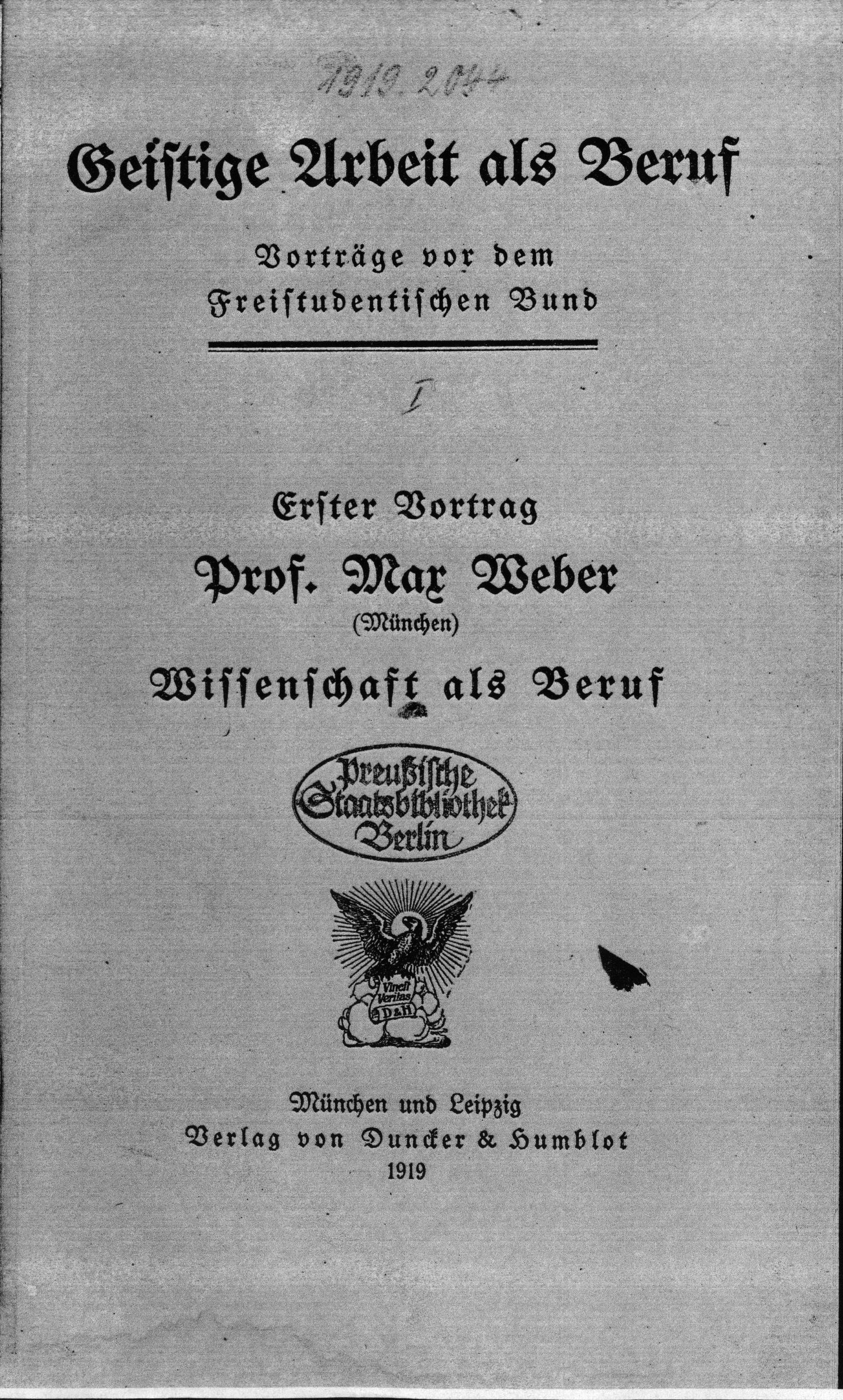Science as a Vocation on:
[Wikipedia]
[Google]
[Amazon]
 ''Science as a Vocation'' (German: ''Wissenschaft als Beruf'') is the text of a lecture given in 1917 at
''Science as a Vocation'' (German: ''Wissenschaft als Beruf'') is the text of a lecture given in 1917 at
Original text ''Wissenschaft als Beruf'' at German Wikisource
Online ebook of ''Science as a Vocation''
online eBook Sociology essays Essays by Max Weber Ludwig Maximilian University of Munich 1917 speeches 1917 essays Existentialist books {{sociology-book-stub
 ''Science as a Vocation'' (German: ''Wissenschaft als Beruf'') is the text of a lecture given in 1917 at
''Science as a Vocation'' (German: ''Wissenschaft als Beruf'') is the text of a lecture given in 1917 at Munich University
The Ludwig Maximilian University of Munich (simply University of Munich, LMU or LMU Munich; ) is a public university, public research university in Munich, Bavaria, Germany. Originally established as the University of Ingolstadt in 1472 by Duke ...
by German
German(s) may refer to:
* Germany, the country of the Germans and German things
**Germania (Roman era)
* Germans, citizens of Germany, people of German ancestry, or native speakers of the German language
** For citizenship in Germany, see also Ge ...
sociologist and political economist
Politics () is the set of activities that are associated with making decisions in groups, or other forms of power relations among individuals, such as the distribution of status or resources.
The branch of social science that studies poli ...
Max Weber
Maximilian Carl Emil Weber (; ; 21 April 186414 June 1920) was a German Sociology, sociologist, historian, jurist, and political economy, political economist who was one of the central figures in the development of sociology and the social sc ...
. Weber reportedly delivered the lecture "without notes and without pause." The original version of the text was published in German, and at least two translation
Translation is the communication of the semantics, meaning of a #Source and target languages, source-language text by means of an Dynamic and formal equivalence, equivalent #Source and target languages, target-language text. The English la ...
s in English exist.
''Science as a Vocation'' is the first of the two "Vocation" lectures. The second lecture, "Politics as a Vocation
"Politics as a Vocation" () is an essay by German economist and sociologist Max Weber (1864–1920). It originated in the second lecture of a series (the first was '' Science as a Vocation'') he gave in Munich to the "Free (i.e. Non- incorporated ...
," was also delivered in Munich, in January 1919.
Summary
In ''Science as a Vocation'', Weber weighed the benefits and detriments of choosing a career as an academic at a university who studies science or humanities. Weber probes the question "what is the value of science?" and focuses on the nature of ethics underpinning the scientific career. Science, to Weber, gives methods of explanation and means of justifying a position, but it cannot explain why that position is worth holding in the first place; this is the task ofphilosophy
Philosophy ('love of wisdom' in Ancient Greek) is a systematic study of general and fundamental questions concerning topics like existence, reason, knowledge, Value (ethics and social sciences), value, mind, and language. It is a rational an ...
. No science is free from suppositions, and the value of a science is lost when its suppositions are rejected.
At one point in the lecture, Weber compares the nature of an artist's work to that of a scientist. He argues that the artist's work can reach fulfillment; the scientist's work, on the other hand, by its very nature, is designed to be surpassed.
Weber reasons that science can never answer the fundamental questions of life, such as directing people on how to live their lives and what to value. Value, he contends, can only be derived from personal beliefs such as religion
Religion is a range of social system, social-cultural systems, including designated religious behaviour, behaviors and practices, morals, beliefs, worldviews, religious text, texts, sanctified places, prophecies, ethics in religion, ethics, or ...
. He further argues for the separation of reason and faith, noting that each has its place in its respective field but, if crossed over, cannot work.
Weber also separates fact from value in politics. He argues that a teacher should impart knowledge to students and teach them how to clarify issues logically – even political issues – but teachers should never use the classroom to indoctrinate or preach their personal political views.
Weber also makes some practical comments about research and teaching. He notes that good scholars can be poor teachers, and that qualities that make one a good scholar, or a good thinker, are not necessarily the same qualities that make for good leaders or role models.
Dating
There has been some debate about when Weber delivered this lecture. Older sources often give the year as 1918. But based on a range of evidence scholars now think that Weber gave these lectures in 1917.Josephson-Storm, "A note on the dating of Max Weber’s Science as a Vocation” https://absolute-disruption.com/2017/10/24/a-note-on-the-dating-of-max-webers-science-as-a-vocation/Translations
Weber, Max (1946). ''Science as Vocation'', in From Max Weber, tr. and ed. by H. H. Gerth, and C. Wright Mills. New York: Free press. Weber, Max (2004). ''Science as Vocation,'' in The Vocation Lectures, tr. by Rodney Livingstone, and Edited by David Owen and Tracy Strong (Illinois: Hackett Books).References
External links
Original text ''Wissenschaft als Beruf'' at German Wikisource
Online ebook of ''Science as a Vocation''
online eBook Sociology essays Essays by Max Weber Ludwig Maximilian University of Munich 1917 speeches 1917 essays Existentialist books {{sociology-book-stub